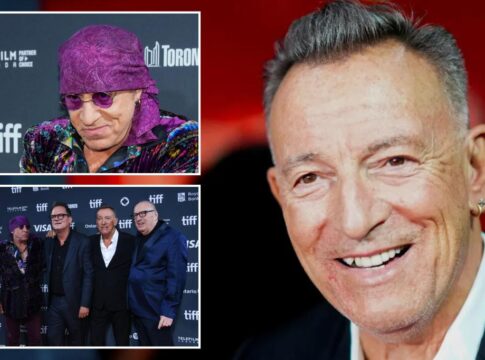Listen to What Next:
Last Wednesday, it happened again. This time in the small city of Wilder, Georgia.
Josie Duffy Rice is a journalist covering criminal justice. She lives in Atlanta, about an hour-and-a-half drive from where the shooting took place. “In some ways, it’s kind of a textbook school shooting situation, right? Which is a crazy term to even be able to say,” Duffy Rice told me.
Four people were killed, two students and two teachers, and at least nine others were hospitalized.
The 14-year-old shooter, Colt Gray, surrendered and was charged as an adult. But then the next day, police charged his father, Colin Gray, as well.
“It seems like it was a gift from his father,” Duffy Rice said. “He got this AR-15 from his father. In Georgia, as I understand it, children are not allowed to purchase handguns. They are allowed to be given them, as gifts, with some kind of regulation around when and where they use them.”
It wasn’t just the gun, though. The teenager also reportedly had a history with law enforcement, given his history of making threats. Those threats included one to shoot up a school. Duffy Rice explained, “It’s unclear the details at this point, but we do know that he made threats before and that the FBI had talked to his father, at least, about the threats.
And he denied them.”
Prosecutors have begun to see charging parents for the crimes of their children as a tool to fight gun violence. And considering how hard it is to pass new gun laws … a lot of people agree. But Duffy Rice is skeptical.
“I have two kids, right? Every single day that I drop them off at school, I wonder what could happen, what’s going to go wrong,” Duffy Rice told me; “I understand that we’re in a country where we are so unwilling to do anything about our gun problem that doing something feels like a victory. But I am concerned that charging the father with manslaughter is signaling that we are actually doing something about a problem that we’re not actually doing anything about.”
On Monday’s episode of What Next, Josie Duffy Rice and I spoke about the latest attempt to prevent school shootings: targeting the parents of perpetrators. Our conversation has been condensed and edited for clarity.
Mary C. Curtis: You’ve argued that charging Colt Gray’s parents, or any shooter’s parents, is not the way to address gun violence. The first part of your argument in this case centers on Georgia and its gun laws. Can you give a brief overview of just who can and can’t own a gun in Georgia?
Josie Duffy Rice: So the short answer is, I can’t give a brief overview because it’s a little complicated, but I’ll put it in some very general terms, OK? So there are some limitations to what minors can have and own and carry in Georgia, but the limitations are pretty minimal. So, you know, it’s not illegal in Georgia for a minor to possess a rifle. It is illegal in Georgia for a minor to possess a handgun, except in certain situations including being monitored by a parent, etc. It is also not illegal for minors in Georgia to possess a shotgun. That doesn’t mean that you can take those guns onto school property, right? That wasn’t legal.
But, you know, the other reality here is that it’s not just about what a minor is allowed to do and not do, but it’s about what a parent, what an adult has to do in terms of safety. So do they have to follow red flag laws, for example. Do they have to have safe storage? And in Georgia, the answer to both of those questions is no. So, I would say that, like in Georgia, the slight boundaries around these laws are so easily surmountable, and intentionally so because we have a Legislature that doesn’t want to really prevent anybody from being able to use a gun when and where they want.
Let’s look at the charges. The father’s been charged with two counts of second-degree murder, four counts of involuntary manslaughter, and eight counts of cruelty against children. Did the charges of involuntary manslaughter or cruelty to children make more sense to you than the murder counts?
I would say the child endangerment charges make more sense to me than manslaughter. Manslaughter makes more sense to me than the murder charge. I would put it in that order. I think we get to a question of, like, what does the law say and what do I think it should say? We often are so horrified by people’s behavior that we kind of expand the limits of the law to include behavior that technically doesn’t fit, but we really want to punish this person.
And then we use that expanded definition from that point forward. And there might be more charges. There are allegations of perjury. There are allegations of other kinds of abuse and misconduct. But I am not comfortable with this idea that parents are responsible in a way for preventing all of these social and societal harms that Georgia has said are not only legal, but are OK.
That doesn’t mean that I’m endorsing what this parent does. And every time a case happens, I’m not just thinking about this case. I’m thinking about the next cases. And frankly, I’m thinking about the people who don’t look like Colin Gray. Because when we think through how the criminal law expands and then punishes, there are cases like this where everybody says, “Yeah, you know, lock him up.” And then we watch as other people, less culpable people, get caught in that web. And I’m aware of how this system has long disguised its unwillingness to actually solve the problem by punishing someone and then saying, “Look, look, look; look what we did. Look how we got justice!” No, this isn’t justice.
So Colt Gray—the 14-year-old—he’s going to be tried as an adult. Although in his first court appearance, the judge noted that as a minor, he cannot be given the death penalty. Does this complicate the case against the dad? I mean, how much responsibility is laid at Colt’s feet since he’s being tried as an adult? And how much responsibility is being put on the father?
I think that’s the real question, right? If he is an adult and if the legal system sees him as an adult and is saying there’s no difference from someone who does this at 14 and someone who does this at 24, then I don’t think the legal system should be allowed to then turn around and say, well, he’s a kid, and the parent failed him.
That is using legal fictions to get as much punishment as possible without dealing with the actual truth here. I don’t think the fact that he’s being tried as an adult is going to have really any impact on his father’s case. I guess it could have an impact on his father’s defense. Perhaps his lawyers will say, you know, we can’t have it both ways. But that’s not really a question for the jury, right? That’s a question for the Legislature. And so I don’t expect that that will negate any punishment his father may receive.
Josie, do you get the sense that every state is going to entertain charging parents in this way?
Yeah, I think this is how this is going to happen, right? And look, I, in general, think that we excessively rely on punishment when we should rely on prevention. I think if charging parents leads to every parent in the country suddenly saying, “Oh shit, I’m not going to get my kid a gun,” or “I’m not going to make guns available to them, I’m going to make sure I lock them up,” that would be aces. That’d be excellent, right? I mean, these are complicated, really big esoteric questions, but I think that, like, if I believed this was going to be a deterrent, a really strong deterrent, I think I would feel less ambivalent about it.
But what we’ve seen is that this echoes every single kind of punitive trend in the history of America, especially the last 30 to 40 years, where what we do is: We have a problem. We do not solve the problem. We wait until people die, and then we overpunish the problem. And we expect, OK, well, now parents will lock their guns up. Now parents will be more careful. And maybe some parents will. But what we know is that deterrence doesn’t always work on the back end. In fact, it often does not work.
And even more than that, what we know is that gun culture as a kind of middle finger to the government, to the legal system, is incredibly pervasive. So I think in some ways, what we’re doing is grasping for straws in hopes that we build and create some sort of response to what is an incredibly ingrained and tangled and devastating reality in America, which is that we have a gun problem that is unmatched in the rest of the world.




